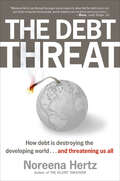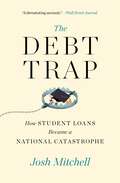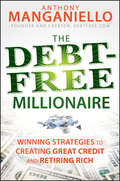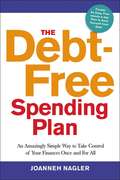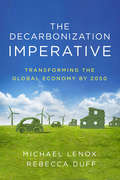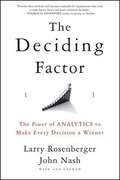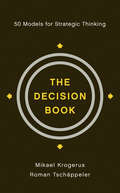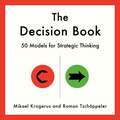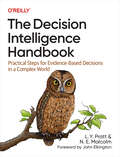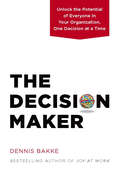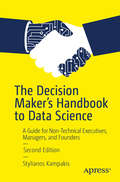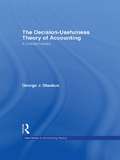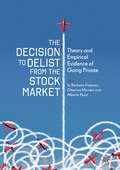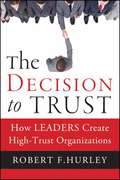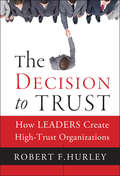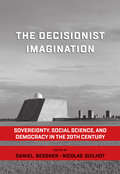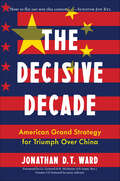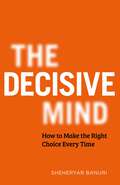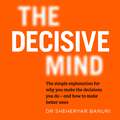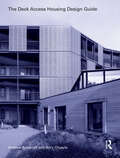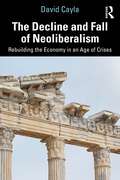- Table View
- List View
The Debt Threat: How Debt is Destroying the Developing World . . . and Threatening Us All
by Noreena HertzNoreena Hertz, one of the world's leading experts on economic globalization, looks at the history of third-world debt and its crippling effects on people in developing countries.Drawing from her impressive debt-relief campaign, fact-finding travels, and meetings with top-ranking officials, Hertz offers a probing analysis of the origins of this rampant burden and its evolution through the decades. With clear principles of justice, she uncovers the imbalance of power and misuse of corrupt dictators and reckless lenders.
The Debt Trap: How Student Loans Became a National Catastrophe
by Josh MitchellAN NPR AND NEW YORK POST BEST BOOK OF 2021 From acclaimed Wall Street Journal reporter Josh Mitchell, the &“devastating account&” (The Wall Street Journal) of student debt in America.In 1981, a new executive at Sallie Mae took home the company&’s financial documents to review. &“You&’ve got to be shitting me,&” he later told the company&’s CEO. &“This place is a gold mine.&” Over the next four decades, the student loan industry that Sallie Mae and Congress created blew up into a crisis that would submerge a generation of Americans into $1.5 trillion in student debt. In The Debt Trap, Wall Street Journal reporter Josh Mitchell tells the &“vivid and compelling&” (Chicago Tribune) untold story of the scandals, scams, predatory actors, and government malpractice that have created the behemoth that one of its original architects called a &“monster.&” As he charts the &“jaw-dropping&” (Jeffrey Selingo, New York Times bestselling author of Who Gets in and Why) seventy-year history of student debt in America, Mitchell never loses sight of the countless student victims ensnared by an exploitative system that depends on their debt. Mitchell also draws alarming parallels to the housing crisis in the late 2000s, showing the catastrophic consequences student debt has had on families and the nation&’s future. Mitchell&’s character-driven narrative is &“necessary reading&” (The New York Times) for anyone wanting to understand the central economic issue of our day.
The Debt-Free Millionaire: Winning Strategies to Creating Great Credit and Retiring Rich
by Anthony ManganielloPRAISE FOR THE MILLIONAIRE DEBT-FREE "The Debt-Free Millionaire is a clarion call for a generation that was brought up on spending tomorrow's money today. As someone who spent time in the financial services industry, I can unequivocally state that Anthony's pragmatic and refreshingly contrarian approach to the real secrets of cash-flow management—and leveraging the credit system—are a breath of fresh air in a smog-choked world of misinformation and confusing financial advice. I can think of a million reasons to read it." —MICHAEL DIFRISCO President, BrandXcellence "Read this book. Do what it says. Start living the dream. If you're ready to take charge of your financial future, this is the place to start." —KEITH J. CUNNINGHAM Keys to the Vault & Business School for Entrepreneurs "The Debt-Free Millionaire offers unique insights, little known strategies and easy-to-understand practical tools to first manage then eliminate debt. It is a must read for both consumers and financial professionals to better explain the often complex world of debt management. More like getting sensible advice from a good friend than a technical financial advisor." —ROY BALFOUR President of Ro???Mart Inc. "Tony has produced a clear and straightforward guide to debt, and how to eliminate it, that is as timely as it is needed. Anyone who follows the program in this book will be glad they did." —JEFFREY K. MEEK Former Vice President–Recovery Operations, WaMu Card Services "Great for readers of all ages and in all financial stages. This isn't one of those get-rich-quick schemes. This book provides a foundation for a paradigm shift in your thinking process and allows for you to see how to achieve the seemingly unachievable. I was hooked from the beginning!" —JENNA KEEHNEN Executive Director, www.USOBA.org
The Debt-Free Spending Plan: An Amazingly Simple Way to Take Control of Your Finances Once and for All
by Joanneh Nagler<p>Anyone suffering under the crushing weight of debt knows how impossible it can seem to find a way out. It's overwhelming - and the more complicated the proposed solution, the harder it is to stick with it. That's why The Debt-Free Spending Plan is SIMPLE. It doesn't require sifting through chapters of high-minded financial advice or digging up your past spending history. It assumes you need help RIGHT NOW, and gives it to you. <p>You will learn to: <p> <li>Downsize expenses without feeling deprived <li>Allocate money as it comes in and put together an easy-to-manage bill-paying plan <li>Adjust for inevitable overspending <li>Pay off debt without gouging expenses and (believe it or not) start saving </li> <p> <p>The plan is clear, easy, and takes just five minutes a day - and it doesn't matter if you make $14,000 or $14 million. With straightforward daily spending strategies and effortless expense tracking tools, you will soon find yourself on the road to financial freedom - all before the next billing cycle.</p>
The Decade of the Multilatinas
by Javier SantisoLatin American multinationals (multilatinas) have been central in the rise of emerging markets in the last few decades. Their development comprises part of the global shift of wealth and power between nations. The rise of firms in a broad range of sectors - including construction, oil, telecommunications and the aeronautical industry - as important regional and global players is spreading: companies in Brazil, Mexico, Columbia, Chile and many others are part of this increasing phenomenon. This book analyses the trends, the countries and the firms involved, and explores the implications for the US, China, Spain and the rest of Europe. In particular, Javier Santiso examines how Spain might profit from positioning itself as a unique hub between Europe and Latin America. The Decade of the Multilatinas includes a wide range of statistical data which will be useful to scholars, policymakers and commentators on Latin America in particular, and international business more generally.
The Decarbonization Imperative: Transforming the Global Economy by 2050
by Michael Lenox Rebecca DuffTime is of the essence. Climate change looms as a malignant force that will reshape our economy and society for generations to come. If we are going to avoid the worst effects of climate change, we are going to need to effectively "decarbonize" the global economy by 2050. This doesn't mean a modest, or even a drastic, improvement in fuel efficiency standards for automobiles. It means 100 percent of the cars on the road being battery-powered or powered by some other non-carbon-emitting powertrain. It means 100 percent of our global electricity needs being met by renewables and other non-carbon-emitting sources such as nuclear power. It means electrifying the global industrials sector and replacing carbon-intensive chemical processes with green alternatives, eliminating scope-one emissions—emissions in production—across all industries, particularly steel, cement, petrochemicals, which are the backbone of the global economy. It means sustainable farming while still feeding a growing global population. Responding to the existential threat of climate change, Michael Lenox and Rebecca Duff propose a radical reconfiguration of the industries contributing the most, and most harmfully, to this planetary crisis. Disruptive innovation and a particular calibration of industry dynamics will be key to this change. The authors analyze precisely what this might look like for specific sectors of the world economy—ranging from agriculture to industrials and building, energy, and transportation—and examine the possible challenges and obstacles to introducing a paradigm shift in each one. With regards to existent business practices and products, how much and what kind of transformation can be achieved? The authors assert that markets are critical to achieving the needed change, and that they operate within a larger scale of institutional rules and norms. Lenox and Duff conclude with an analysis of policy interventions and strategies that could move us toward clean tech and decarbonization by 2050.
The Decentralization Dilemma in India
by Catriona PurfieldA report from the International Monetary Fund.
The Deciding Factor
by John Nash Larry E. Rosenberger Ann GrahamPraise for The Deciding Factor"Both companies and governments have made some poor decisions recently, and almost all would benefit from more fact-based and analytical approaches. This book provides clear methods and extensive examples for organizations that want to make better, faster, and more consistent decisions."-Thomas H. Davenport, author, Competing on Analytics, and President's Distinguished Professor of Information Technology and Management, Babson College"The secrets of the decision-making processes employed by the most successful corporations of the world are revealed in The Deciding Factor. Both corporate decision makers as well as analysts will gain invaluable insights from this treasure trove of case studies and expert guidelines." -Robert Heller, former president and CEO of VISA U.S.A., and former governor, Federal Reserve Board"Information, used correctly and creatively, can be a source of tremendous customer value, competitive advantage, and company profitability. The Deciding Factor will help you understand if you have this opportunity, and how you might seize it."-Nigel Morris, co-founder, Capital One Financial Services"There has never been a more important time in business history to truly understand both the technical strengths and conceptual weaknesses of decision analytics. If you're prepared to be serious, The Deciding Factor offers the insider's insights that matter when managing innovation risk."-Michael Schrage, author, Serious Play, and research associate, MIT Sloan School of Management
The Decision Book: 50 Models For Strategic Thinking (The\tschäppeler And Krogerus Collection)
by Jenny Piening Philip Earnhart Roman Tschäppeler Mikael KrogerusA short, sharp guide to tackling life's biggest challenges: understanding ourselves and making the right choices. Every day offers moments of decision, from what to eat for lunch to how to settle a dispute with a colleague. Still larger questions loom: How can I motivate my team? How can I work more efficiently? What is the long tail anyway? Whether you're a newly minted MBA, a chronic second-guesser, or just someone eager for a new vantage point, The Decision Book presents fifty models for better structuring, and subsequently understanding, life's steady challenges. Interactive and thought-provoking, this illustrated workbook offers succinct summaries of popular strategies, including the Rubber Band Model for dilemmas with many directions, the Personal Performance Model to test whether to change jobs, and the Black Swan Model to illustrate why experience doesn't guarantee wisdom. Packed with familiar tools like the Pareto Principle, the Prisoner's Dilemma, and an unusual exercise inspired by Warren Buffet, The Decision Book is the ideal reference for flexible thinkers.
The Decision Book: Fifty models for strategic thinking
by Roman Tschäppeler Mikael KrogerusMost of us face the same questions every day: What do I want? How can I get it? How can I live more happily and work more efficiently?This updated edition of the international bestseller distils into a single volume the fifty best decision-making models used on MBA courses, and elsewhere, that will help you tackle these important questions - from the well known (the Eisenhower matrix for time management) to the less familiar but equally useful (the Swiss Cheese model). It will even show you how to remember everything you'll have learned by the end of it.Stylish and compact, this little book is a powerful asset. Whether you need to plot a presentation, assess someone's business idea or get to know yourself better, this unique guide will help you simplify any problem and take steps towards the right decision.
The Decision Intelligence Handbook: Practical Steps for Evidence-Based Decisions in a Complex World
by L. Y. Pratt N. E. MalcolmDecision intelligence (DI) has been widely named as a top technology trend for several years, and Gartner reports that more than a third of large organizations are adopting it. Some even say that DI is the next step in the evolution of AI. Many software vendors offer DI solutions today, as they help organizations implement their evidence-based or data-driven decision strategies.But until now, there has been little practical guidance for organizations to formalize decision making and integrate their decisions with data.With this book, authors L. Y. Pratt and N. E. Malcolm fill this gap. They present a step-by-step method for integrating technology into decisions that bridge from actions to desired outcomes, with a focus on systems that act in an advisory, human-in-the-loop capacity to decision makers.This handbook addresses three widespread data-driven decision-making problems:How can decision makers use data and technology to ensure desired outcomes?How can technology teams communicate effectively with decision makers to maximize the return on their data and technology investments?How can organizational decision makers assess and improve their decisions over time?
The Decision Maker
by Dennis BakkeWho makes the important decisions in your organization? Strategy, product development, budgeting, compensation-such key decisions typically are made by company leaders. That's what bosses are for, right? But maybe the boss isn't the best person to make the call.That's the conclusion Dennis Bakke came to, and he used it to build AES into a Fortune 200 global power company with 27,000 people in 27 countries. He used it again to create Imagine Schools, the largest non-profit charter-school network in the U.S.As a student at Harvard Business School, Bakke made hundreds of decisions using the case-study method. He realized two things: decision-making is the best way to develop people; and that shouldn't stop at business school. So Bakke spread decision-making throughout his organizations, fully engaging people at all levels. Today, Bakke has given thousands of people the freedom and responsibility to make decisions that matter.In The Decision Maker, a leadership fable loosely based on Bakke's experience, the New York Times bestselling author shows us how giving decisions to the people closest to the action can transform any organization.The idea is simple.The results are powerful.When leaders put real control into the hands of their people, they tap incalculable potential. The Decision Maker, destined to be a business classic, holds the key to unlocking the potential of every person in your organization.
The Decision Maker's Handbook to Data Science: A Guide for Non-Technical Executives, Managers, and Founders
by Stylianos KampakisData science is expanding across industries at a rapid pace, and the companies first to adopt best practices will gain a significant advantage. To reap the benefits, decision makers need to have a confident understanding of data science and its application in their organization. It is easy for novices to the subject to feel paralyzed by intimidating buzzwords, but what many don’t realize is that data science is in fact quite multidisciplinary—useful in the hands of business analysts, communications strategists, designers, and more.With the second edition of The Decision Maker’s Handbook to Data Science, you will learn how to think like a veteran data scientist and approach solutions to business problems in an entirely new way. Author Stylianos Kampakis provides you with the expertise and tools required to develop a solid data strategy that is continuously effective. Ethics and legal issues surrounding data collection and algorithmic bias are some common pitfalls that Kampakis helps you avoid, while guiding you on the path to build a thriving data science culture at your organization. This updated and revised second edition, includes plenty of case studies, tools for project assessment, and expanded content for hiring and managing data scientists Data science is a language that everyone at a modern company should understand across departments. Friction in communication arises most often when management does not connect with what a data scientist is doing or how impactful data collection and storage can be for their organization. The Decision Maker’s Handbook to Data Science bridges this gap and readies you for both the present and future of your workplace in this engaging, comprehensive guide.What You Will LearnUnderstand how data science can be used within your business.Recognize the differences between AI, machine learning, and statistics.Become skilled at thinking like a data scientist, without being one.Discover how to hire and manage data scientists.Comprehend how to build the right environment in order to make your organization data-driven. Who This Book Is For Startup founders, product managers, higher level managers, and any other non-technical decision makers who are thinking to implement data science in their organization and hire data scientists. A secondary audience includes people looking for a soft introduction into the subject of data science.
The Decision Usefulness Theory of Accounting: A Limited History (Routledge New Works in Accounting History)
by George J. StaubusThis book ties together selected contributions by George Staubus to the early development of the decision-usefulness theory of financial accounting--the theory that has become generally accepted accounting theory in the last half of the twentieth century and is the basis for the FASB's conceptual framework.
The Decision to Delist from the Stock Market: Theory and Empirical Evidence of Going Private
by Alberto Pezzi Ottorino Morresi Barbara FidanzaIn an organized and organic way, this book covers all the possible theoretical and empirical facets of delisting, adding to the well-developed literature on IPOs. IPO and delisting are strictly related; the reasons for delisting may be found in the loss of the incentives that drove the firm to the public market in the past. However, the book presents unique motivations not directly related to the IPO decision. This book covers what the existing literature has not in focusing on specific aspects such as market liquidity and microstructure, listing costs, market for corporate control, corporate governance issues and so on. Of interest to academics and students, this contribution puts all pieces in order and finds a thread that can link each theory to the others.
The Decision to Trust: How Leaders Create High-Trust Organizations
by Robert F. HurleyA proven model to create high-performing, high-trust organizations Globally, there has been a decline in trust over the past few decades, and only a third of Americans believe they can trust the government, big business, and large institutions. In The Decision to Trust, Robert Hurley explains how this new culture of cynicism and distrust creates many problems, and why it is almost impossible to manage an organization well if its people do not trust one another. High-performing, world-class companies are almost always high-trust environments. Without this elusive, important ingredient, companies cannot attract or retain top talent. In this book, Hurley reveals a new model to measure and repair trust with colleagues managers and employees. Outlines a proven Decision to Trust Model (DTM) of ten factors that establish whether or not one party will trust the other Filled with original examples from Daimler, PriceWaterhouse Coopers, Goldman Sachs, Microsoft, QuikTrip, General Electric, Procter and Gamble, AzKoNobel, Johnson and Johnson, Whole Foods, and Zappos Reveals how leaders in Asia, Europe, and North America have used the DTM to build high-trust organizations Covering trust building in teams, across functions, within organizations and across national cultures, The Decision to Trust shows how any organization can improve trust and the bottom line.
The Decisionist Imagination: Sovereignty, Social Science and Democracy in the 20th Century
by Nicolas Guilhot Daniel BessnerIn the decades following World War II, the science of decision-making moved from the periphery to the center of transatlantic thought. The Decisionist Imagination explores how “decisionism” emerged from its origins in prewar political theory to become an object of intense social scientific inquiry in the new intellectual and institutional landscapes of the postwar era. By bringing together scholars from a wide variety of disciplines, this volume illuminates how theories of decision shaped numerous techno-scientific aspects of modern governance—helping to explain, in short, how we arrived at where we are today.
The Decisive Decade: American Grand Strategy for Triumph Over China
by Jonathan D. WardWith a focus on the economic battlefront and in-depth analysis of the diplomatic, military, and ideological arenas, the world’s foremost expert on US-China global competition offers a rousing, strategic call to action and playbook—harvesting all of our nation’s ingenuity, confidence, and will power—to outcompete the long-term strategies of China and its Communist Party. In The Decisive Decade, Dr. Jonathan D.T. Ward—China scholar and founder of the Atlas Organization, a consultancy focused on US-China global competition—offers a comprehensive framework for how the United States can, and must, defeat China on the world stage economically, diplomatically, militarily, and ideologically. International security and American supremacy are at stake—and now is the time for the US to take action. China’s global power and influence grows every day. Working from a deep sense of national identity, the Chinese Communist Party is leading its country toward what it deems “the great rejuvenation of the Chinese Nation,” and executing a long-term Grand Strategy to topple over its chief adversary, the United States. As China becomes increasingly repressive domestically and aggressive overseas, it threatens to upend America’s global dominance at every turn. Ward provides novel and practical strategies that our government, as well as our businesses and our citizens, can utilize to undermine our adversary. Exhaustive campaigns in the economic, diplomatic, military, and ideological arenas, he argues, must be taken to achieve victory. With expert analysis of the history of US-China relations, as well as insight into how the Russia-Ukrainian war can inform our strategic thinking, The Decisive Decade presents a unique toolkit for our triumph over China. We can succeed, but it won’t be easy; it will take all of our nation’s ingenuity, confidence, and willpower to win.
The Decisive Mind: How to Make the Right Choice Every Time
by Dr Sheheryar Banuri*Available for pre-order: a new model for understanding and optimising your decision making skills by a leading behavioural economist*__________Have you ever set yourself a goal but struggled to achieve it? In a world overflowing with choices and distractions, indecision can be paralysing. It can lead to missed opportunities, stress, even damaged relationships. In The Decisive Mind, decision making expert Professor Sheheryar Banuri provides a new framework to choose the life you want, one decision at a time. Using real-world examples and his own ground-breaking research, Professor Banuri shows how even the smallest decisions have a profound impact on our lives. By understanding and streamlining your own process of decision-making, you will be able to make simple, effective, and efficient choices to help you edge closer to your aspirations and achieve your goals. From big, life-altering choices to the everyday decisions that shape your routine, The Decisive Mind puts you in control of your decision-making and sets you on the path to a more decisive you. Whether you seek to make bold career moves, enhance your relationships, or simply improve your overall well-being, this book will help you harness the immense potential of you. __________
The Decisive Mind: How to Make the Right Choice Every Time
by Dr Sheheryar Banuri*Available for pre-order: a new model for understanding and optimising your decision making skills by a leading behavioural economist*__________Have you ever set yourself a goal but struggled to achieve it? In a world overflowing with choices and distractions, indecision can be paralysing. It can lead to missed opportunities, stress, even damaged relationships. In The Decisive Mind, decision making expert Professor Sheheryar Banuri provides a new framework to choose the life you want, one decision at a time. Using real-world examples and his own ground-breaking research, Professor Banuri shows how even the smallest decisions have a profound impact on our lives. By understanding and streamlining your own process of decision-making, you will be able to make simple, effective, and efficient choices to help you edge closer to your aspirations and achieve your goals. From big, life-altering choices to the everyday decisions that shape your routine, The Decisive Mind puts you in control of your decision-making and sets you on the path to a more decisive you. Whether you seek to make bold career moves, enhance your relationships, or simply improve your overall well-being, this book will help you harness the immense potential of you. __________
The Decisive Mind: How to Make the Right Choice Every Time
by Dr Sheheryar BanuriA new model for understanding and optimising your decision-making skillsHave you ever wondered why you make bad decisions? Or why it's so hard to make a decision in the first place? Through pioneering research into behavioural science, decisions expert Dr Sheheryar Banuri has designed an entirely novel decision-making framework which can be adopted into everyday life to help us better our decision-making skills by understanding and streamlining the process. The result? Simple, effective and efficient techniques to combat indecision.The Decisive Mind will draw on examples from evolutionary psychology, examine our ability (or inability) to prioritise and highlight the scenarios that force decision-making errors, and help us understand our own minds. By unpicking a lifetime's worth of misconceptions about our own decision-making patterns and habits, this audiobook will guide you on your first steps towards optimising your own brain space.(P) 2023 Hodder & Stoughton Limited
The Deck Access Housing Design Guide: A Return to Streets in the Sky
by Andrew Beharrell Rory OlcaytoThe Deck Access Housing Design Guide is the first practical design guide to deck access housing. It focuses on the contemporary use of deck access housing, sharing practical guidance and providing in-depth case studies, while also presenting historical context about this flexible and evolving housing type. Despite a chequered history that saw it linked with urban decay and social malaise in the 1970s and 80s, deck access housing today, after a 40-year hiatus, is fast becoming the default solution for mid-rise housing in the UK, and London in particular. This is in part down to architects’ renewed interest in post-war Modernist typologies, but also due to specific planning standards that favour the qualities – dual-aspect plans, ‘public’ front doors – of deck access design. This comprehensive, professional guide spotlights the best contemporary deck access housing in the UK and throughout mainland Europe, explaining and analysing exemplars in detail. Illustrated in full colour throughout with plans, elevations, photographs, project data and annotations, case studies include both new build and retrofit projects, in public housing, co-housing and Third Age residential projects. Good architectural practice flows from an informed understanding of cultural and design history coupled with practical guidance and clear analysis of case studies. That is what this book provides for anyone interested in, or involved in the design and delivery of, deck access housing. Featured architects from the UK: AHMM · Apparata · Cartwright Pickard · Collective Architecture · DO Architecture · Hawkins Brown · Haworth Tompkins · Henley Halebrown · Levitt Bernstein · Maccreanor Lavington · Mæ · Matthew Lloyd · Pitman Tozer · Pollard Thomas Edwards · Proctor & Matthews · PRP · RCKa Featured architects from mainland Europe: ANMA · Arquitectura Produccions · Atelier Kempe Thill · Bureau Massa · DAMAST · Estudio Herreros · Fink + Jocher · KAAN · LEVS · Martin-Löf · MEF · Muñoz Miranda · Passelac & Roques · Waechter + Waechter
The Decline and Fall of Neoliberalism: Rebuilding the Economy in an Age of Crises
by David CaylaThe Decline and Fall of Neoliberalism argues that the neoliberal era – starting after the collapse of the Bretton Woods system – is coming to an end. In the wake of the financial and economic crisis of 2008 and the outbreak of the pandemic in 2019, the doctrine outlined by monetarists appears to offer an inadequate response to the economic instability that characterises our contemporary world. To deal with the fallout of these crises, central banks have stepped in as major regulators of the economic system through massive interventions to support both financial markets and public spending, marking a clean break with the traditional conception of their role as depoliticised actors. Is the resurgence of inflation a consequence of this reckless strategy over which they seem to have lost control? Or is it rather rooted in an outdated understanding of money and monetary policy? One thing is certain: a profound change in policy is emerging. The growing turmoil in the global economy and the environmental challenges that face us demand an urgent and comprehensive rethinking of the economic role of the state. This book further develops the analysis presented in Populism and Neoliberalism and takes a closer look at the nature of neoliberalism as a political doctrine. Through this detailed description, it identifies the difficulties within economic thought that prevent it from responding appropriately to contemporary challenges. Drawing from the lessons of history, it proposes a renewed relationship between the state and the market that strikes a balance between planning and self-regulation. A post-neoliberal world is about to dawn, but its shape can still be determined by the path we choose to follow.
